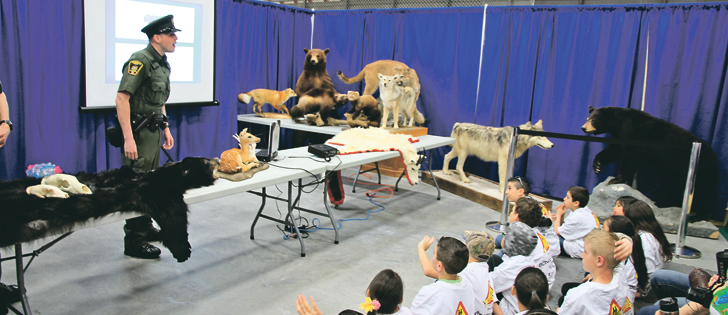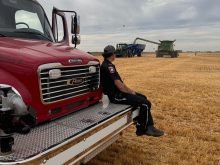The Progressive Agriculture Foundation marks 23 years of delivering presentations on potential dangers and safety around farm chemicals, grain bins and equipment, train crossings, wildlife and other hazards unique to rural areas
An entanglement in a tractor’s power take-off launched the idea for Progressive Agriculture safety days in Lac La Biche, Alta.
Colleen Pierce’s son, then in Grade 6, was pounding posts with his father the fall day it happened.
He was wearing his father’s coveralls and straddling the power take-off when it grabbed the garment and pulled him in.
“You realize how quickly farm incidents can happen,” said Pierce.
“Sometimes you just don’t realize the dangers. You are thinking about getting something done and don’t realize the risks.”
Read Also

Agri-business and farms front and centre for Alberta’s Open Farm Days
Open Farm Days continues to enjoy success in its 14th year running, as Alberta farms and agri-businesses were showcased to increase awareness on how food gets to the dinner plate.
He was airlifted to Edmonton and recovered from serious leg injuries.
After his recovery, the young 4-H club member researched how such incidents could be prevented, found the Progressive Agriculture Foundation and encouraged his family to get involved.
Now in its 10th year, the safety presentations and evening programming presented by grades 5 to 8 students reflect topics particularly concerning in the region. They include subjects such as bear awareness, distracted driving and electrical, chemical, fire and underground pipelines safety.
This year, they are slated for April 25-26.
“With each and every session, you want it to be age appropriate and interactive,” said Pierce.
“They (children) are just like sponges.”
Participants move between as many as 18 stations every 15 to 20 minutes. Each one includes a brief introduction, a hands-on or interactive component and a quick summary.
Stephanie Janssens, a Manitoba paramedic and safety day co-ordinator, sees the aftermath of accidents in her job. The most common farm accidents are tractor run-overs and rollovers and getting pulled into augers or sucked under grain piles.
“I want to create awareness so that kids know the dangers out there as well as the parents,” Janssens said.
Her safety day, slated for May 31 in Killarney, targets youth because early education is key to preventing some of these incidents.
“It’s not only for things that happen on the farm but even how to call 911,” said Janssens, who is surprised by how many children don’t know their land location.
She also stressed the importance of easy access to first aid kits in vehicles, barns and homes and being aware of what and who are nearby when operating farm equipment.
In Lac La Biche, sessions focused on rail crossings, the use of guns, biking and quadding with helmets, sun protection, drug safety and seat belt use in vehicles.
“We talk about (medication) prescriptions and how not to take anything that might look like candy,” said Pierce, who cited particular dangers to small children who can’t read labels.
She said grandparents who haven’t had children afoot for some time may not have locked up their cleaning supplies.
Take-home bags help educate extended family about the dangers lurking in and around their homes.
“It’s the whole awareness of things that can happen or potential dangers. It’s reminding us how quickly things can happen,” said Pierce.
The non-profit Progressive Agriculture Foundation provides resources, take-home bags, insurance coverage and T-shirts free of charge to participating communities.
Online resources include 30 topics with hundreds of hands-on activities for each.
The only requirement is for co-ordinators to attend a training session, at a cost of $100.
Bernard Geschke, program specialist with the foundation, said the far-reaching program staged by volunteer co-ordinators hosts more than 400 safety days annually in Canada and the United States.
About 100,000 people have participated in Canada to date with 90 safety days planned this year.
He said topics are chosen by local providers and have changed since the program launched 23 years ago.
“We always have to be changing with the times to stay current,” said Geschke.
It now includes internet, social media and computer safety and addresses strategies for children who might be home alone for certain periods of time.
He said farms are unique because they include family, employees and multiple generations.
“And kids that live, work and play right there in the area,” he said.
Geschke thinks parents can guide the safety messages and lead by example.
Kids are watching when parents are stepping over the power take-off shaft or not wearing a helmet while riding an all-terrain vehicle.
“If Mom, Dad, Grandma and Grandpa do some of those high-risk things, those kids will do some of the high-risk things,” said Geschke.
He said the program measures its success by testing children on their safety knowledge before and at the end of the safety day, but also in follow-up tests three to six months later.
“If that child has retained it for three to six months, odds are they will remember it for life.”
For the future, Geschke said the foundation is considering a farm safety app, given the abundance of cellphones and electronics used by young people today.
What puts young workers at risk?
- lack of experience
- unfamiliar with work
- enthusiasm sometimes outweighs judgment
- risk-taking attitudes
- drive to prove themselves
- reluctance to ask questions















